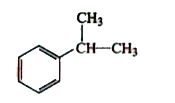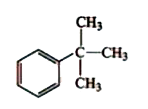Which of the following compounds will give acetic acid with KMnO4/H⊕/Δ:
CH3−CHO
CH3−CH=CH−CH3
CH3−C≡C−CH3
All of these
The correct Answer is:D
To determine which compounds will yield acetic acid (CH3COOH) when treated with KMnO4 in the presence of H+ and heat, we need to analyze the oxidation reactions of the given compounds.
1. Identify the Compounds:
We need to consider the compounds provided in the question. Let's assume the compounds are:
- (a) CH3CHO (acetaldehyde)
- (b) CH3CH=CHCH3 (symmetrical alkene)
- (c) CH3C≡CCH3 (symmetrical alkyne)
2. Understanding the Oxidizing Agent:
KMnO4 is a strong oxidizing agent that can oxidize aldehydes to carboxylic acids, and it can also oxidize alkenes and alkynes to carboxylic acids.
3. Oxidation of Acetaldehyde (CH3CHO):
- When acetaldehyde is treated with KMnO4, it gets oxidized to acetic acid:
CH3CHO+(O)→CH3COOH
- Thus, CH3CHO will give acetic acid.
4. Oxidation of Symmetrical Alkene (CH3CH=CHCH3):
- This symmetrical alkene can be oxidized by KMnO4 to yield two moles of acetic acid:
CH3CH=CHCH3+(O)→2CH3COOH
- Therefore, this compound will also give acetic acid.
5. Oxidation of Symmetrical Alkyne (CH3C≡CCH3):
- The symmetrical alkyne can also be oxidized by KMnO4 to form two moles of acetic acid:
CH3C≡CCH3+(O)→2CH3COOH
- Hence, this compound will also yield acetic acid.
6. Conclusion:
- All the compounds listed (acetaldehyde, symmetrical alkene, and symmetrical alkyne) will give acetic acid when treated with KMnO4, H+, and heat.
Final Answer:
All of the compounds will give acetic acid with KMnO4/H+/Δ.
---
We need to consider the compounds provided in the question. Let's assume the compounds are:
- (a) CH3CHO (acetaldehyde)
- (b) CH3CH=CHCH3 (symmetrical alkene)
- (c) CH3C≡CCH3 (symmetrical alkyne)
KMnO4 is a strong oxidizing agent that can oxidize aldehydes to carboxylic acids, and it can also oxidize alkenes and alkynes to carboxylic acids.
- When acetaldehyde is treated with KMnO4, it gets oxidized to acetic acid:
CH3CHO+(O)→CH3COOH
- Thus, CH3CHO will give acetic acid.
- This symmetrical alkene can be oxidized by KMnO4 to yield two moles of acetic acid:
CH3CH=CHCH3+(O)→2CH3COOH
- Therefore, this compound will also give acetic acid.
- The symmetrical alkyne can also be oxidized by KMnO4 to form two moles of acetic acid:
CH3C≡CCH3+(O)→2CH3COOH
- Hence, this compound will also yield acetic acid.
- All the compounds listed (acetaldehyde, symmetrical alkene, and symmetrical alkyne) will give acetic acid when treated with KMnO4, H+, and heat.
All of the compounds will give acetic acid with KMnO4/H+/Δ.
Similar Questions
Knowledge Check
Which of the following aromatic compounds will react with KMnO4 ?
A B
B C
C D
D
Which of the following compounds may give reaction with acidic KMnO4 ?
A B
B C
C D
D
Which of the following compounds are more acidic than H2O?
ACH3−OHBH−O∣∣C−OHCCH3−..NH2D
Which of the following compound(s) give two acids on dissolution in H2O?
View SolutionWhich of the following compounds will give butanone on oxidation with alkaline KMnO4 solution?
View SolutionWhich of the following compounds will give butanone on oxidation with alkaline KMnO4 solution?
View SolutionWhich of the following compounds will give butanone on oxidation with alkaline KMnO4 solution ?
View SolutionWhich of the following compound will give butanone on oxidation with alkaline KMnO4 solution ?
View Solution
